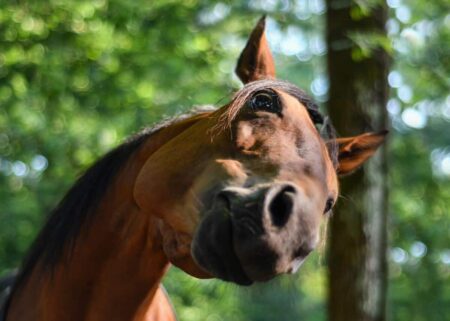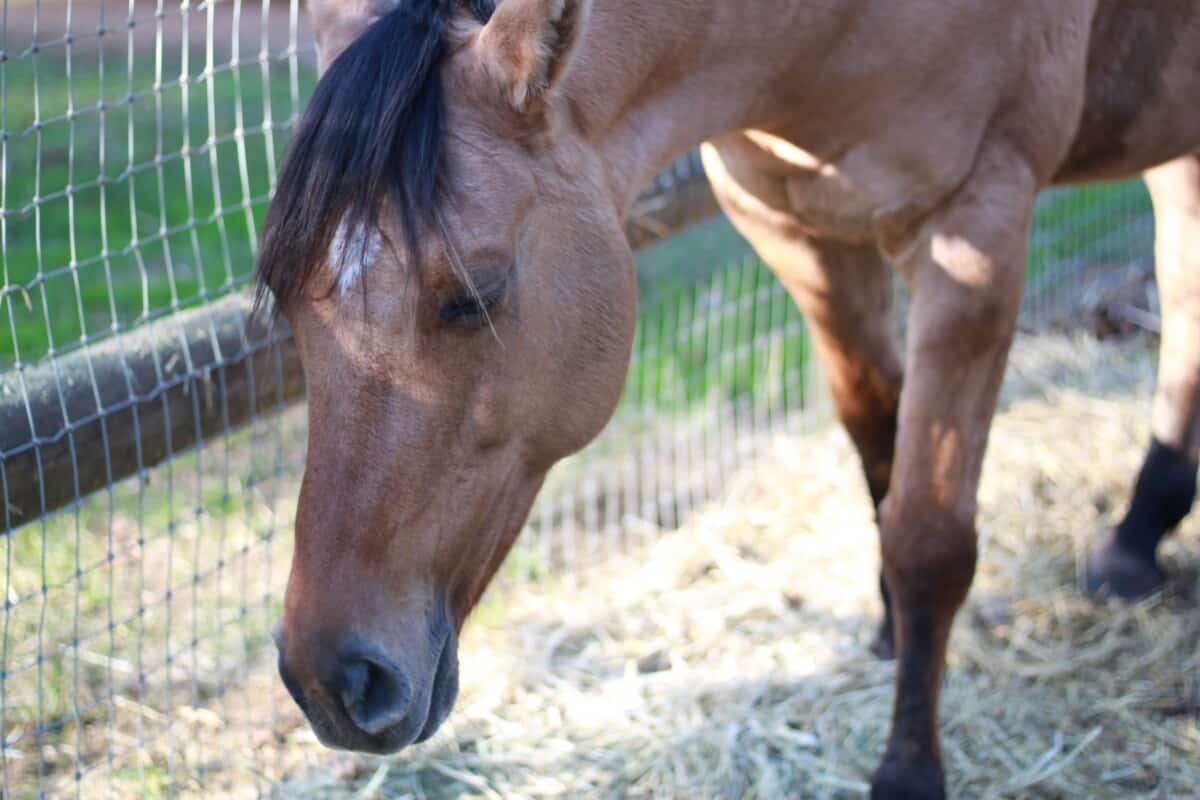
I don’t know about you, but when I think of food cravings, it’s tasty treats like chocolate or chips that come to mind. Granted, I’m not a herbivore and I don’t eat grass but even so when my horse is seen by-passing the luscious green grass and chowing down on a lump of mud, I’m left scratching my head in confusion. It’s true what they say though; Mother Nature does tend to know what she’s doing. But…what is she doing? Why do horses lick and eat dirt?
There could be a number of reasons that your horse is eating mud or licking dirt, ranging from boredom and habit to dietary supplementation. It’s usually completely normal and presents no cause for concern – it’s more likely to bother you than it is to be harmful to your equine companion. That said, it’s always good to investigate any behaviors that are new and understand what might be driving them; eating dirt is no exception.
First of all, it’s par for the course for horses to pick up dirt whilst they are grazing, both accidentally and deliberately. They may even chew on small rocks and mud. Of course, we tend to rasp our own horses’ teeth to keep them healthy but in the wild, this is one of the ways they maintain their dental hygiene naturally. So it’s unsurprising that domesticated horses might mimic that same behavior.
There are a few other reasons they might lick or eat dirt.
Boredom
We all know that when horses get bored – if they’re on box rest or perhaps are just particularly anxious characters – they are at risk of developing stable vices; weaving, head shaking, wind sucking to name just a few. Licking dirt is no different. It’s something to do, after all.
Instinct
Horses, like rabbits (and there’s a strong connection, believe it or not) eat little and often in the wild and spend nearly all of their time in the pursuit of, or consuming food. Remove their ability to follow this behavioral pattern – either by confining them to lengthy periods in a stable or limiting their grazing, and they may start to lick the ground anyway, just because the behavior is hard-wired in.
Dietary
There are conflicting opinions in regard to whether horses lick dirt due to dietary deficiencies. The general consensus is that, if your horse is actually suffering a serious deficiency, it will manifest itself physically as well as behaviourally, and I would tend to stand by that assertion. It is entirely plausible though, that your horse might be licking dirt in order to top up microbes in his gut, in much the same way as we are sometimes encouraged to drink microbial yogurts to top up ours. No harm will come to us if we don’t, but we may see some benefit if we do.

It’s also true that if horses eat the grass that grows above the ground, there’s no reason why they might not want to eat the roots that are growing underground, or the soil surrounding those roots. After all, that’s where the grass gets its nutrients and hydration from. Your horse might instinctively know that this is one of nature’s gifts and that he should be keen to get his hooves on it.
The kind of soil that’s around can also have a bearing on whether your horse licks or eats it. Clay soils, in particular, are good for calming an equine tummy upset, so If your horse has a mild bellyache, he might find some relief in licking the ground if it has a high clay content. In the wild, he’d have no choice but to rely on a natural remedy like this, so it should be no surprise that he reverts to such behaviors in a time of need.
It’s important to note though, that if you have sandy soil or sand menage for example, and your horse is licking or eating this, then you do need to try and stop him from doing so as ingestion of sand can be harmful.
Salt. All of us need salt and most of us like it as well. Horses are no different. Some patches of ground are high in salt and other mineral content, so if you see your horse and the rest of his herd licking dirt in the same area of their field time and time again, this is most likely why. It’s not necessarily a sign that your horse needs more salt in his diet long term, but actually that he just likes the taste, or perhaps has been exercising rigorously and has lost salt through sweating.
Habit
Whatever the initial reason for your horse licking dirt, once the behavior has started, like any other, it can be difficult to change. It may just be that he tried it, liked it, and now can’t get out of the groove.
Distracting your Horse From Licking or Eating Dirt
So, in asking ourselves ‘why do horses lick dirt?’, we come to understand that it is a natural behavior and in itself should give us no cause for concern. However, it may serve as a useful indicator that there are other ways in which we could enrich our horse’s life. After all, we want him to be as happy and fulfilled as he can be. Plus, if you want him to change his behavior then you’ll need to provide an attractive alternative.
Toys
Like dogs, horses enjoy playing with balls, solving puzzles and foraging for food. There are plenty of options available to buy but you can also think about homemade options such as cleaned and dried milk containers with pony nuts in. Anything that is sturdy, mobile and makes a noise. You’ll probably get bonus points if it has a treat or reward involved as well. Do make sure it’s safe and check on your horse regularly while he is ‘playing’.
Sufficient Exercise
It sounds so obvious, but it’s vital that your horse is getting enough exercise in order that he doesn’t get frustrated and start developing ‘boredom’ behaviors such as head bobbing or licking dirt. It’s not all about riding, you can also lunge him, use a walker, turn him out more frequently. If you are having a challenge giving him enough exercise, there are usually plenty of willing volunteers, just remember to vet them carefully to ensure they are the right fit for you and your horse.
Salt/Mineral licks
These can be bought from almost any equine store or online and popped in the stable or field. They provide a source of added sodium and other minerals and can offer a good outlet for your horse’s dirt licking tendencies. Using a salt or mineral lick (also known as a salt or mineral block) can also be useful if you have limited turnout or your soil is particularly sandy. A simple addition to your horse’s diet and great for keeping him occupied.
Companionship

Horses are herd animals and more often than not, they need companionship. If you have plenty of turnout and enrichment in other areas for your horse and he is still developing habits such as licking dirt, you may want to think about getting him a companion.
It doesn’t always mean purchasing another animal, there might be someone local who would welcome a companion for their horse too (or goat or donkey) and often shared grazing can be a cheaper option, so it’s beneficial all around.
Good Grazing
So, your horse has plenty of turnout time and companionship, enough exercise and mental stimulation but it still licking dirt? Maybe you just don’t have enough good quality grass. Try sectioning the field off to rest and rotate the grazing or use a different area altogether for turnout until you can improve the quality of the grass and give him something to munch on while he is out there.

Just as you would with any other element of his behavior, if you are concerned about your horse licking or eating dirt or it is accompanied by other changes, it is always best to consult a veterinarian to be absolutely sure there isn’t anything sinister underlying. In most cases though, it is only our unique human sensibilities telling us that eating dirt is not a good idea.
So, whilst we might raise an eyebrow at our treasured steeds enjoying a mouthful of mud, to them, it is entirely natural and really rather tasty. Perhaps, as you are looking at him wondering ‘Why do horses lick dirt?’, he’s looking at you, wondering why on earth you don’t?
You Might Also Like…
Can Horses Eat Pumpkin? What You Can and Can’t Feed a Horse
Do Horses Get Cold? How to Care for Your Horse in Winter
This article is accurate and true to the best of the author’s knowledge. It is not meant to substitute diagnosis, prognosis, treatment or any type of medical advice for humans or horses. Animals exhibiting signs and symptoms of distress should be seen by a veterinarian immediately.


